Key takeaways:
- Networking is about building genuine relationships that can lead to unexpected career opportunities and support systems.
- Effective communication, including clarity and sharing personal stories, enhances connections and fosters trust.
- Leveraging social media and following up after meetings are vital strategies for maintaining professional relationships.
- Measuring networking success focuses on the quality of interactions and opportunities created, rather than the quantity of contacts.
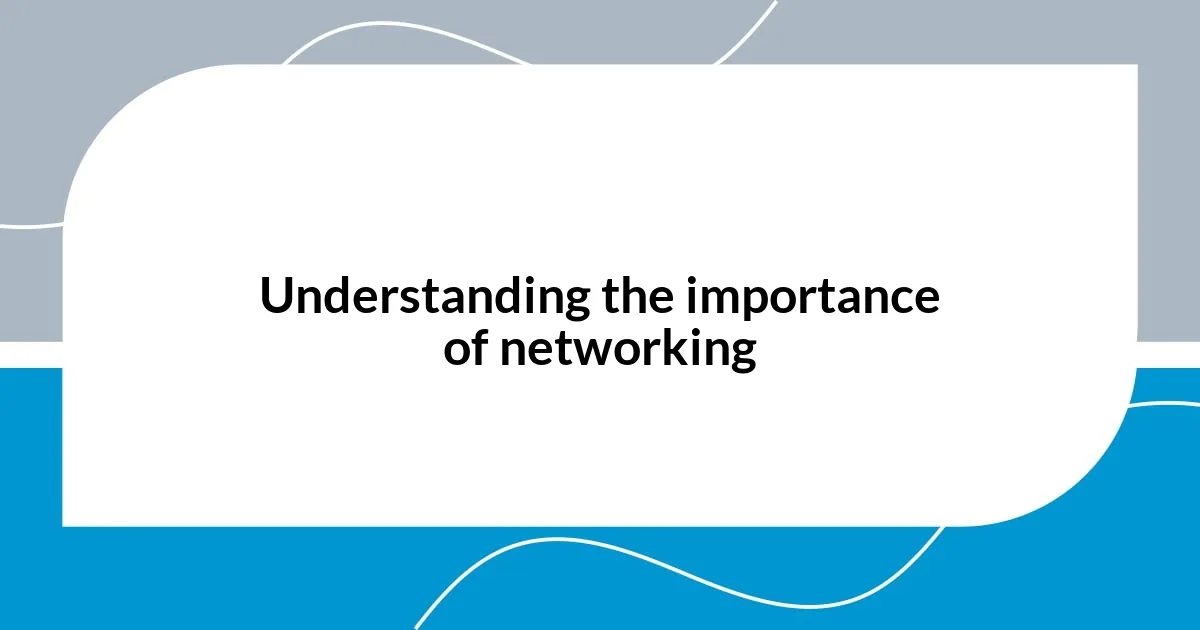
Understanding the importance of networking
Networking is far more than just exchanging business cards; it’s about building genuine relationships. I remember attending a conference early in my career, feeling overwhelmed. After striking up a conversation with a seasoned professional, I discovered not only valuable industry insights but also a mentor who guided me through challenging times. Isn’t it incredible how a single conversation can open doors that you didn’t even know existed?
Moreover, in today’s fast-paced world, connections often lead to unexpected opportunities. I once landed a freelance project simply because someone I met at a networking event remembered my passion for a particular niche. That brief chat made me a top-of-mind candidate for a project. Have you ever thought about how one small connection could transform your career trajectory?
Networking also fosters a support system that can prove invaluable. I often turn to my network when I face a tough decision or need fresh perspectives. It’s comforting to know that I have people who not only share my interests but also genuinely want to see me succeed. Isn’t that kind of support worth cultivating?
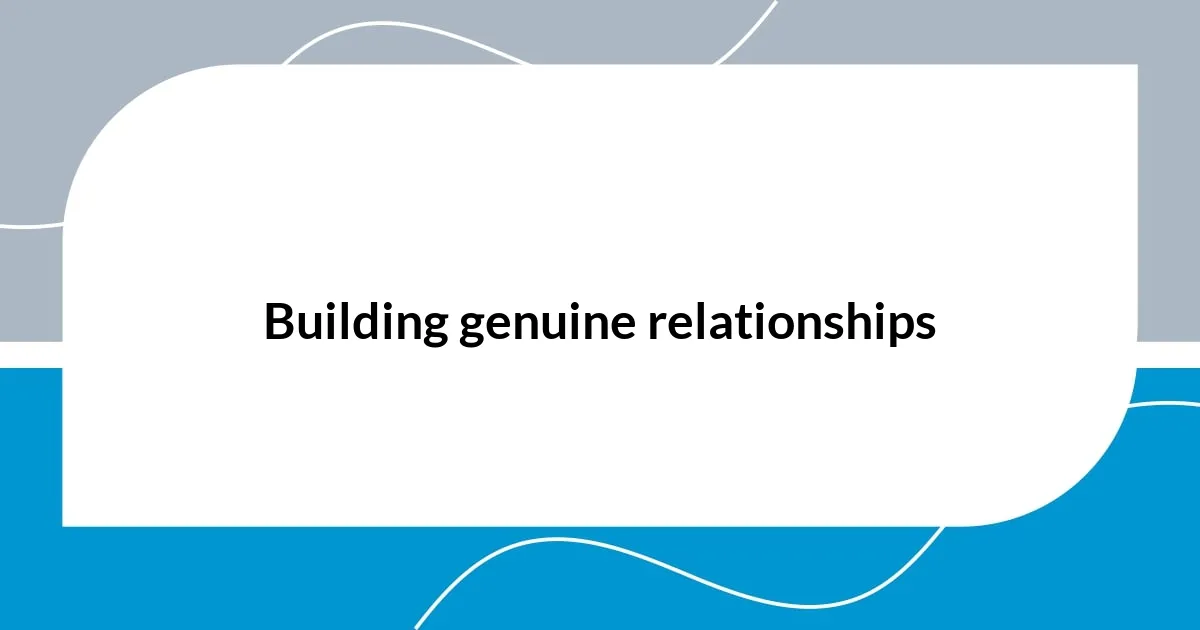
Building genuine relationships
Building authentic relationships in networking has been a game-changer for me. I recall a time when I was struggling with a project deadline. I reached out to a colleague I had met at a workshop. Our conversation didn’t just help me brainstorm solutions; it forged a stronger bond between us. That experience reinforced my belief that vulnerability can deepen connections and often leads to unexpected support.
Here are some key elements that I find essential for building genuine relationships:
- Be Authentic: People appreciate sincerity. Share your true interests and passions.
- Listen Actively: Engage in conversations with genuine curiosity. It shows you value the other person.
- Follow Up: A simple message after a meeting can reaffirm your interest in staying connected.
- Share Resources: Offering help or information fosters a sense of reciprocity.
- Stay Consistent: Make it a habit to reach out and check in. Consistency builds trust over time.
These practices have transformed my networking efforts into meaningful connections that enrich both my personal and professional life.
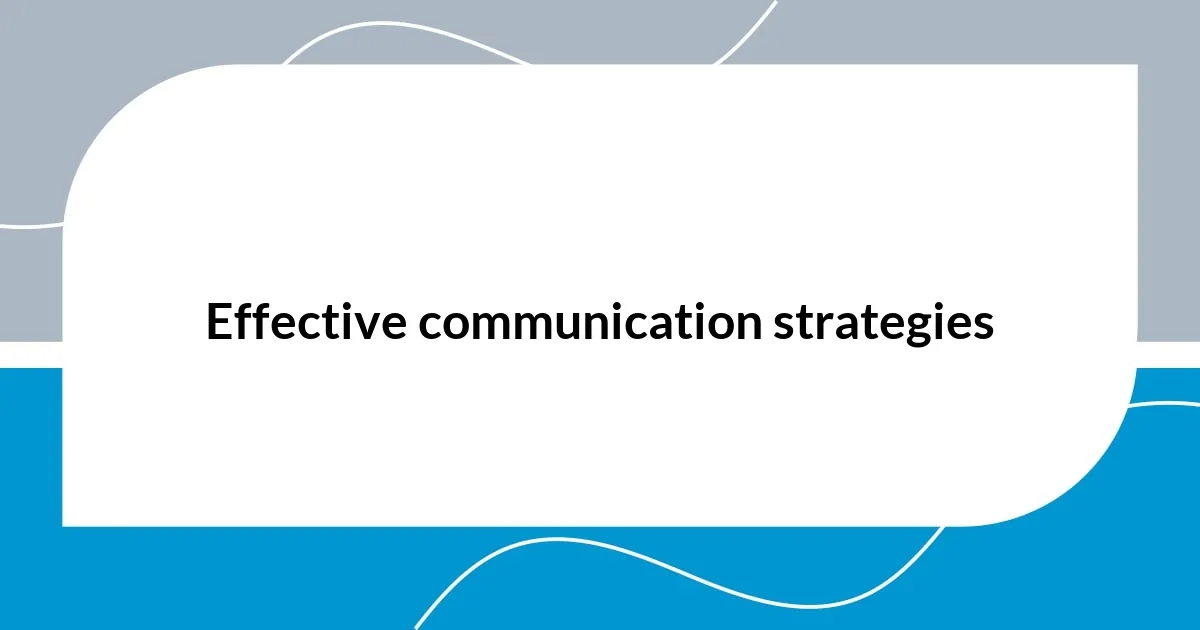
Effective communication strategies
Effective communication in networking is crucial for forging lasting relationships. From my experience, clarity is key. When I share my thoughts or ideas, I ensure I articulate them clearly and avoid jargon unless I’m confident the other person understands it. This approach has often resulted in more fruitful conversations, as people appreciate transparency and the ability to grasp what I’m saying without confusion. Have you ever felt lost in technical talk? That’s why I strive to keep my language simple and straightforward.
Another strategy that has worked wonders for me is being present in conversations. During a recent virtual networking event, I used the chat feature to respond promptly to others while maintaining eye contact with the speaker. This dual engagement not only made the speaker feel valued, but it also allowed me to connect with multiple people simultaneously. I’ve noticed that taking an active role in discussions often invites others to share more about themselves, creating a richer dialogue and building rapport. Isn’t it amazing how a little attention can make a big difference in communication?
In my journey, sharing personal stories has also proven effective in enhancing connections. When I attended a local meetup, I opened up about my early career struggles with imposter syndrome. To my surprise, several people resonated with my experiences and felt encouraged to share their own stories. This openness created an atmosphere of trust, allowing us to connect on a deeper level. It’s moments like these that remind me of the power of emotional honesty in networking.
| Effective Communication Strategies | Description |
|---|---|
| Clarity | Articulating thoughts clearly to avoid confusion and foster understanding. |
| Presence | Engaging actively in conversations to create deeper connections. |
| Personal Stories | Sharing emotional experiences to build trust and relate to others. |
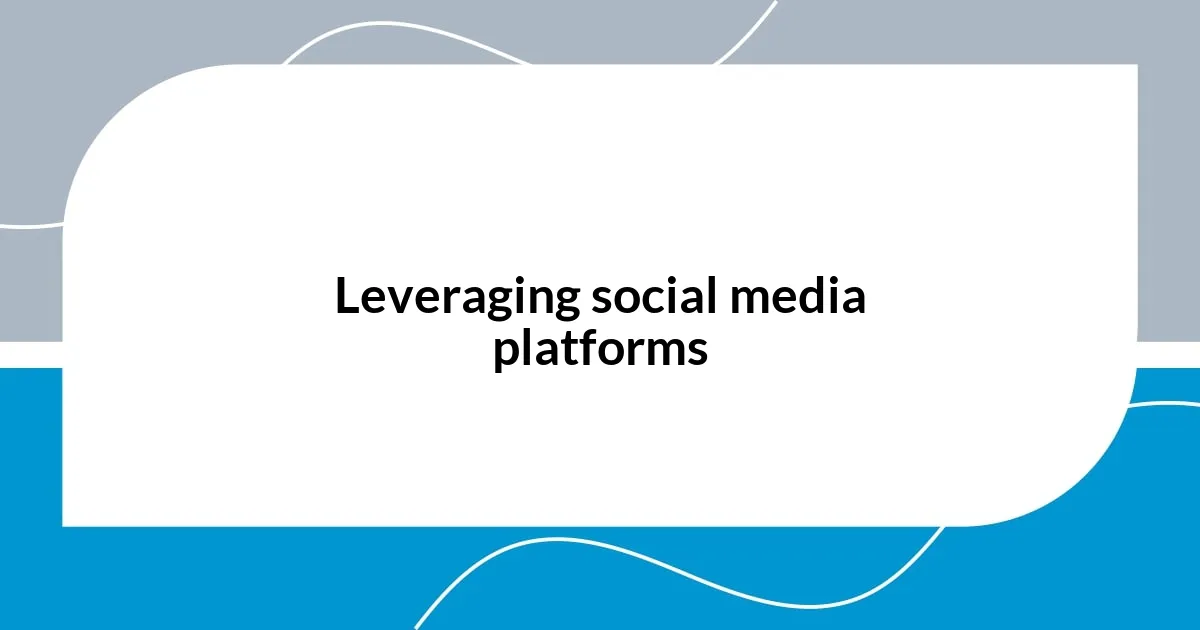
Leveraging social media platforms
Using social media platforms for networking has truly transformed my professional relationships. I remember when I first started connecting on LinkedIn; I was hesitant to reach out to people I admired. However, sending personalized connection requests turned out to be the catalyst I needed. Those quick, thoughtful messages often led to engaging discussions, opening doors to collaborations I wouldn’t have envisioned otherwise. Can you imagine missing out on such opportunities simply because of the fear of rejection?
I’ve also discovered the power of sharing valuable content on these platforms. When I post insights related to my field, I’ve noticed that it not only showcases my expertise, but it also invites others to engage and share their thoughts. For instance, after sharing an article about emerging trends in our industry, several connections chimed in with their perspectives, fostering a vibrant dialogue. This interaction doesn’t just enhance visibility—it’s a chance to connect with like-minded individuals who share similar passions. Isn’t it rewarding to see how a simple post can spark meaningful conversations?
Another aspect I’ve found incredibly valuable is participating in online groups or communities. Joining niche forums on platforms like Facebook or LinkedIn has allowed me to meet professionals I wouldn’t have encountered otherwise. I recall joining a group focused on a specific skill I was developing, and it became a goldmine of resources and connections. Often, I would engage in discussions and offer my own insights, and soon enough, I was not just a participant but a recognized member. These groups have enriched my understanding and expanded my network significantly—like watering a garden and watching it thrive!
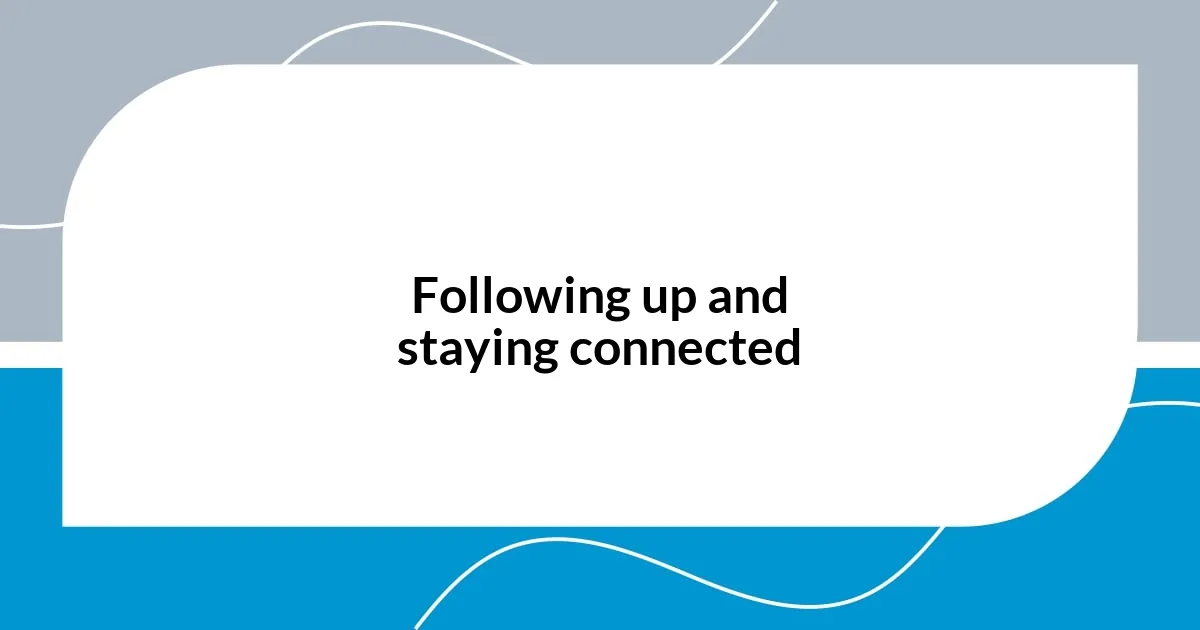
Following up and staying connected
Following up after initial meetings has been a game changer for me. I remember a time when I met someone interesting at a conference; I took a quick moment to jot down my thoughts on our conversation and their interests. When I followed up a week later with a personalized email referencing our chat, it felt good to offer a resource related to their project. That small gesture turned our brief encounter into a lasting professional relationship. Isn’t it incredible what a little follow-up can do?
Staying connected doesn’t have to be time-consuming, either. I like to set reminders to check in with my contacts every few months. Whether it’s a quick message on LinkedIn or a casual email, those small touchpoints keep us on each other’s minds. For instance, I recently dropped a line to a former colleague about an industry article I thought might interest them. This simple act rekindled our dialogue and led to a coffee catch-up, which not only strengthened our bond but also led to exciting collaboration ideas.
In a world driven by digital interactions, I’ve found that sending a handwritten note can leave a lasting impression. After a successful meeting or collaboration, I’ve started sending thank-you cards. I can still recall the joy I felt when a contact responded, saying my note made their day. It’s a reminder that genuine connections thrive on thoughtfulness. Have you ever had a positive reaction from someone just because you took the time to go the extra mile? It truly reinforces the importance of connection in networking.

Developing a personal brand
Developing a personal brand is essential in establishing my presence in any networking space. I remember when I first identified my unique strengths and passions; it felt like finding a guiding star. By consistently showcasing my skills and values, I’ve noticed that people are more inclined to reach out, resonating with my authentic self. Isn’t it amazing how clarity in one’s brand can draw others in like a magnet?
One of my favorite strategies has been creating a cohesive online presence. I curate my social media profiles to reflect my professional persona. This means using a consistent photo, clear bio, and engaging content that aligns with my brand. I once received a message from a potential collaborator simply because they liked my profile’s consistency and the insights I shared. It taught me that a well-crafted online identity can open unexpected doors. Have you ever thought about how your digital footprint represents you?
Additionally, I actively seek opportunities to share my story through public speaking and workshops. There was a particular event where I shared my journey and challenges, making it relatable. The feedback was humbling—many attendees expressed that my authenticity inspired them to pursue their own aspirations. Creating a personal brand isn’t just about promoting oneself; it’s about connecting with others on a deeper level. Could there be a more fulfilling experience than that?
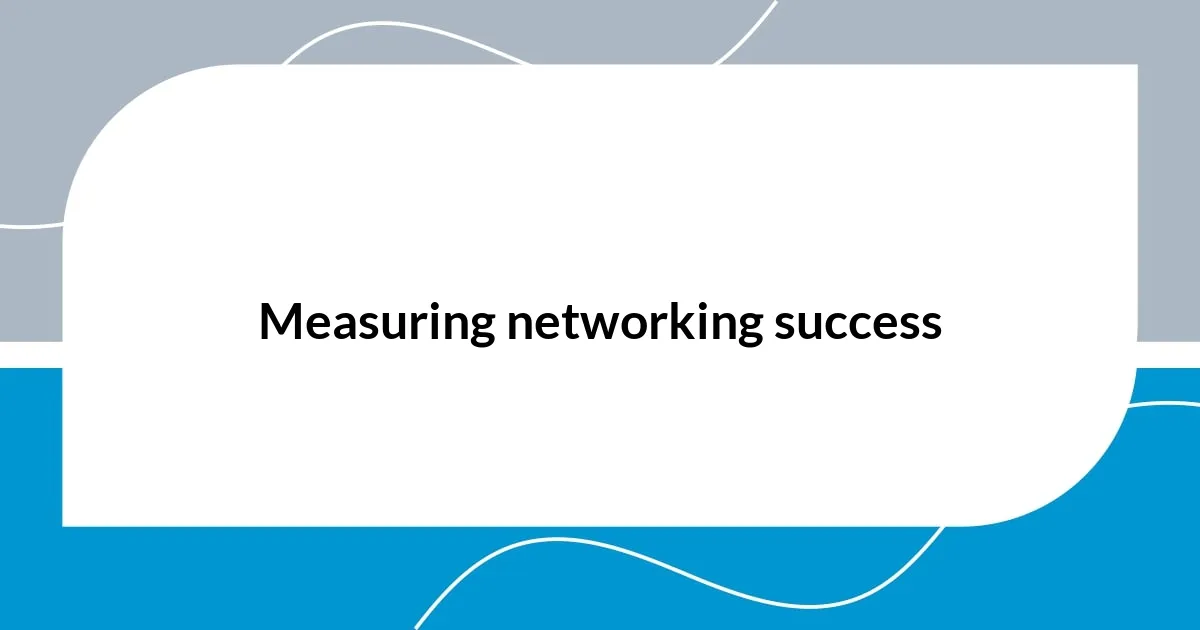
Measuring networking success
Measuring the success of my networking efforts often comes down to how many meaningful connections I’ve made. Instead of counting the number of business cards I’ve collected, I focus on the quality of interactions that lead to actual conversations. I recall a time when I had a series of coffee chats scheduled after a networking event. The conversations I had felt authentic and led to two collaborations later on. Doesn’t it feel more rewarding to have a few solid relationships rather than a stack of contact cards?
To gauge success, I also reflect on the opportunities that arise from my network. A few months ago, I received a job referral from someone I met at a workshop. It made me realize that networking isn’t just for finding new contacts; it’s also about creating avenues for growth. What can be more validating than knowing that you’re on someone else’s radar? This kind of feedback motivates me to nurture my connections continuously.
Tracking follow-ups and responses is another practical metric for assessing networking success. I keep a simple spreadsheet where I note each interaction and the resulting outcomes. Recently, I revisited this tracking method and noticed an increase in engagement after sending personal notes. It reminded me of the importance of intention in every touchpoint. Have you ever considered how small steps can lead to significant results in your networking journey?